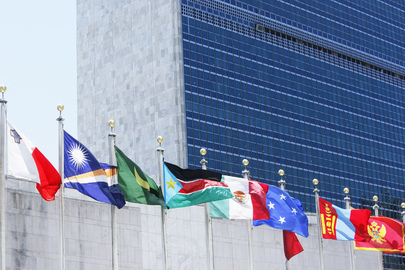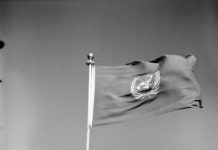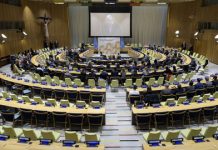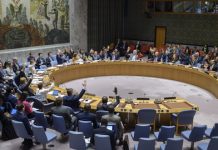Some carried weapons of war; others ammunition – the very items on which their eligibility for the disarmament, demobilization, and reintegration (DDR) process they were about to embark on depended.
Well-wishes rang out from the small crowd of locals gathered in Sanguere-Lim, Koui Sub-Prefecture, to see the combatants off as they walked from the 3R assembly point towards the nearby makeshift disarmament site being set up by the national unit overseeing and implementing the process.
Music also played out – part of the Government awareness campaign – as a song blared from loudspeakers calling on Central Africans to lay down their arms “in order to go to school, to cultivate the fields or for any kind of livelihood, lay down your weapons, for peace”.
Ongoing operations
The disarmament and demobilisation initiative in Sanguere-Lim marked the latest in a series of ongoing operations launched in July.
They followed a landmark peace agreement between the Government and the 3R and another armed group Unité pour la Paix en Centrafrique (UPC) – signed in N’Djamena, Chad, in April – marking their return to the peace process in the CAR.
The UN peacekeeping mission in the country, MINUSCA, supports the DDR operations, in line with its mandate. The Government launched the national programme in December 2018, and MINUSCA has been providing extensive financial, logistical, technical and security ever since.
The UN peacekeeping force in the Central African Republic is supporting the disarmament and demobilization of members of armed groups.
Looking forward to a new life
Abel Delatid, 25, who joined the 3R in 2017, was among the combatants being disarmed. “I heard about the peace agreement in N’Djamena through awareness-raising by MINUSCA and local authorities. I am looking forward to vocational training to start a new life as I lost my leg during fighting,” he said after surrendering his weapon.
A few obligatory stops awaited the combatants, including handover of weapons or ammunition, a body search, and registration and receipt of a disarmament certificate.
They also receive a medical check-up, choice of vocational training, a special allowance, and starter kit to help with the new road ahead.
Ambition to join the army
For his part, Aroun Isa Oumar expressed a desire to leave behind the tough years spent in the bush.
He hoped to receive training in order to join the national army – a recurrent wish among many combatants – perhaps driven by a lack of information about available programmes supporting reintegration.
Time and time again, Awareness Campaign Officer, Jean Christophe Namyona, briefed ex-combatants stopping at his desk to opt for a preferred vocational training or income-generating activity of their choice – such as commerce, husbandry or carpentry – should they not be eligible for military service.
Disarmament and demobilization operations are guided by a 2016 National DDR Strategy, which outlines specific eligibility criteria.
For example, ex-combatants seeking to join the army must be between 18 and 25.
Eligibility further depends on owning a functional or reparable weapon, or the surrender of 200 rounds of ammunition, eight grenades, or 10 rockets.
Among the combatants previously disarmed in the area was Mbekaka Ursula Aicha, a 29-year-old mother of two and the only female ex-combatant to join the DDR process there.
‘Peace is possible’
She had joined the 3R movement three years earlier, driven by a sense of protest against what she described as the marginalisation of her community.
“I agreed to disarm following the call by the President to return to the country and work for peace, as well as in accordance with orders from the 3R leadership. Now that we have laid down our weapons, peace is possible,” she said.
The Sub-Prefect of Koui, Larry Nordine Mahalba, stressed the importance of disarmament and demobilization and commended MINUSCA’s support.
“For five years, the 3R occupied this region. MINUSCA has supported us on multiple levels – bringing relief to a traumatized population.
Wilfried Relwende Sawadogo, Coordination Officer with the UN Mission, noted that “crucially, disarmament and demobilization operations contribute to pacifying communities, thereby advancing the key MINUSCA mandated task to protect civilians.”
For Sanguere-Lim resident Adama Yaouba, life has turned a corner thanks to disarmament in the locality. “Today, armed groups have laid down their arms, and everything has changed. Before, we never slept peacefully; we lived in constant fear, always on edge. But now, I can sleep calmly, free from worry.”
The 3R Political Coordinator, Yaya Amadou, himself disarmed during previous operations, encouraged others to follow suit.
“The time for war is over, and now is the time to make peace,” he said.
A young member of an armed group in the Central African Republic prepares to hand in his weapon.
Source of original article: United Nations (news.un.org). Photo credit: UN. The content of this article does not necessarily reflect the views or opinion of Global Diaspora News (www.globaldiasporanews.net).
To submit your press release: (https://www.globaldiasporanews.com/pr).
To advertise on Global Diaspora News: (www.globaldiasporanews.com/ads).
Sign up to Global Diaspora News newsletter (https://www.globaldiasporanews.com/newsletter/) to start receiving updates and opportunities directly in your email inbox for free.



























